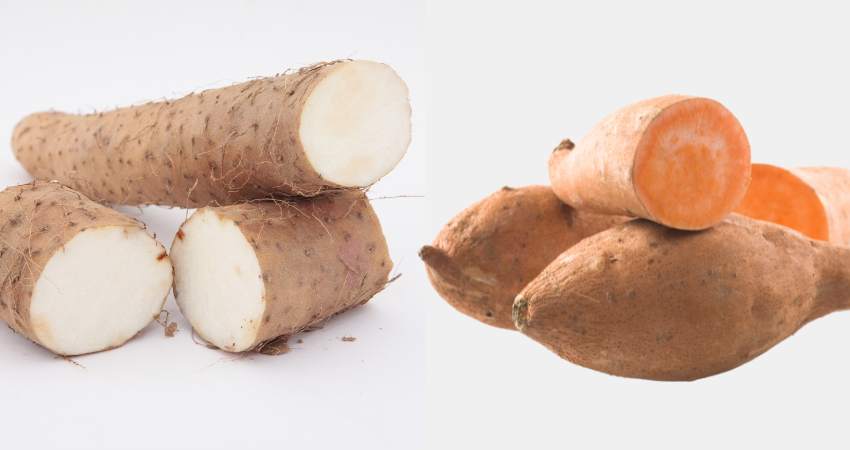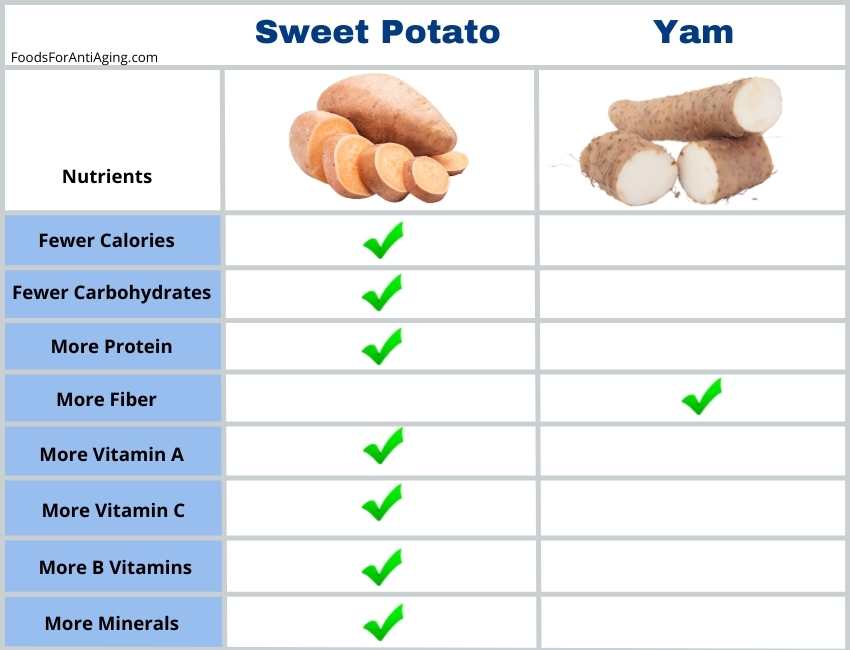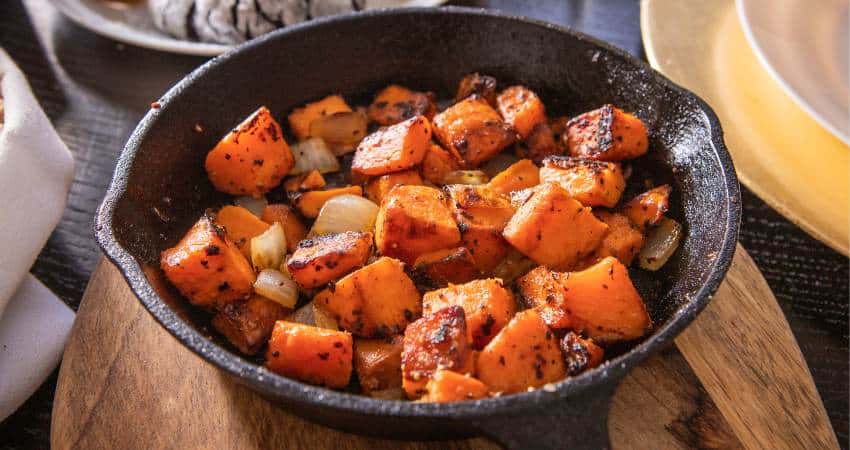Sweet Potato vs Yam: Are Yams Healthier? Let’s Compare
As a Certified Health Coach some of my clients ask about sweet potatoes and yams. They wonder if one may offer more nutritional benefits than the other. Let’s answer, are sweet potatoes or yams healthier?
Sweet potatoes are healthier than yams due to their higher percentage of vitamins and minerals, fewer calories and carbohydrates. Sweet potatoes provide a higher percentage of vitamin A, beta-carotene, vitamin C, B6, B5, thiamin, riboflavin, niacin, magnesium, phosphorus, iron, calcium, zinc, copper and manganese.
This article will include a side-by-side nutrient comparison of the two. In addition, the benefits of these nutrients are explained and why each food is better suited to certain nutritional goals.
In addition to coaching clients about them, I’ve purchased, researched and consumed both prior to, during and sometimes after writing this article.

Sweet Potatoes vs Yam: Nutrition
Any meaningful discussion about health benefits must start with reviewing nutritional information. Therefore, let’s quickly look at the nutrient content of both foods and use it as a basis for the comparison.
Here’s a table of the nutritional contents of a 100-gram (3.5 ounce) serving.
| Sweet Potato Cooked (100 g) | Yam Cooked (100 g) | |
| Calories | 90 | 116 |
| Protein | 2.01 g | 1.49 g |
| Carbohydrates | 20.7 g | 27.5 g |
| Fiber | 3.3 g | 3.9 g |
| Fat | 0.15 g | 0.14 g |
| Sugar | 6.48 g | 0.49 g |
| Vitamin A | 19,200 IU | 122 IU |
| Beta-carotene | 11,500 mcg | 73 mcg |
| Vitamin C | 19.6 mg | 12.1 mg |
| Vitamin B6 | 0.28 mg | 0.22 mg |
| Vitamin B9 (Folate) | 6 mcg | 16 mcg |
| Vitamin B1 (Thiamin) | 0.10 mg | 0.09 mg |
| Vitamin B2 (Riboflavin) | 0.10 mg | 0.02 mg |
| Vitamin B3 (Niacin) | 1.49 mg | 0.55 mg |
| Vitamin B5 (Pantothenic Acid) | 0.88 mg | 0.31 mg |
| Magnesium | 27 mg | 18 mg |
| Phosphorous | 54 mg | 49 mg |
| Potassium | 475 mg | 670 mg |
| Iron | 0.69 mg | 0.52 mg |
| Copper | 0.16 mg | 0.15 mg |
| Calcium | 38 mg | 14 mg |
| Zinc | 0.3 mg | 0.2 mg |
| Manganese | 0.49 mg | 0.37 mg |
Both contain a wide variety of nutrients. At first it may be difficult to figure out which one is better than the other. After all, yams and sweet potatoes are not the same.
Therefore, when comparing the differences between yams vs sweet potatoes, let’s examine if one is better.
Sweet potatoes are better than yams due to their higher percentage of antioxidants, beta-carotene, vitamin A, vitamin C, protein and minerals. Sweet potatoes have a moderate glycemic index which helps keep blood sugar levels lower. They have fewer calories and carbohydrates.
Yams are no slouch either and contain many of the same nutrients. They provide a higher percentage of fiber, folate and potassium.

Sweet Potatoes vs Yams: Health Benefits For Your Plans
The above table tells us several things about the health benefits of both vegetables. Let’s discuss these benefits in greater detail.
Weight Loss
Sweet potatoes pack slightly fewer calories, making them a better option if you’re watching your calorie count to lose weight. Sweet potatoes also have a healthy amount of dietary fiber, particularly when consumed without peeling the skin.
Dietary fiber helps with weight loss by controlling your appetite3. When consumed, it absorbs water to make you feel “fuller.” When you feel fuller, you’re less likely to eat more food.
What all this means is the positive impact of sweet potatoes on weight loss is twofold:
- They provide fewer calories per serving, helping you stick to your daily calorie limit.
- Sweet potato makes you feel full with a relatively small serving, reducing your chances of snacking on unhealthy foods.
Therefore, add sweet potatoes to a recipe on your diet center calendar.
Digestion and Gut Health
Yams and sweet potatoes both contain soluble and insoluble fiber. Fiber remains in the digestive tract and provides gut related health benefits. Fiber rich diets have been linked to regular bowel movements and a lower risk of colon cancer4.
Bodybuilding
One of the golden rules of bulking up is to consume more calories than you burn. Instead of restricting calories to the daily recommended count as you would when trying to get lean, the goal to bulk up would be to exceed that count.
To do that, you need increasing the calories and carbohydrate consumption, and this is where yams shine. If you take a look at the above table, you’ll notice a difference between the carbohydrate content of yams and sweet potatoes. You’ll also notice yams have more calories per serving, which further helps with bulking.
Carbs not only increase the calories, but they assist by being the primary fuel source with the following:
- Brain
- Body
- Athletic performance
Find out how plantains and potatoes compared in taste and texture in my article, Plantain vs Potatoes – Which is Better? Let’s Compare. This link opens to an article in my website.
Healthy carbs provide energy for your workouts and build muscle while optimizing recovery5.
It’s also worth noting that yams have a bit more potassium than sweet potatoes. Specific to bodybuilding, it plays an important role in carbohydrate storage and improves muscle contraction so you can lift more.
Protein, another important factor in building muscle, is needed to help build and repair muscle after workouts. The difference between the two vegetables is not great enough to make much of a difference.
On the days I go to the gym to lift weights, I always try to add some healthy carbs with my morning meal. I find it helps provide energy and makes me feel stronger.
Healthy Eating for the Immune System
Sweet potatoes provide 19.6 mg of vitamin C compared to 12.1 mg for yams. The body can’t make vitamin C, so it must come from the foods ate every day. Vitamin C has been shown in studies to help with the growth and repair of tissues throughout the body6.
Vitamin C helps heal and repair wounds, maintain healthy bones, skin and cartilage. Vitamin C acts as an antioxidant and fights free radicals which damage the cells. Helping to prevent cell damage can help with the following:
- Certain diseases like cancer.
- Heart disease.
- Promote healthy aging.
Although vitamin C is widely talked about for the immune system, vitamin A is important also. According to Harvard University, vitamin A is a great source to stimulate healthy white blood cells7.
These cells have the responsibility of keeping the immune system as healthy as possible to fight viruses and illnesses effectively.
Therefore, benefit your immune system by following recipes healthy in vitamin C with a yam or sweet potato.
Find out how the purple variety of both foods compared to each other in my comparison article.

Heart Health
Sweet potatoes and yams benefit the heart in several ways. One reason is due to the vitamin C. This vitamin helps lower blood pressure in individuals with elevated blood pressure levels and those without8.
Vitamin C also helps check several risk factors of heart disease, including the following:
- High blood pressure.
- High levels of “bad” cholesterol.
- Low “good” cholesterol levels.
By reducing these real risk factors with healthy eating, it helps reduce your chances of developing heart disease.
The effectiveness of Vitamin C in reducing the risk of heart disease is well documented in various studies.
For instance, a review of 9 scientific studies with almost 300,000 participants established maintaining a daily consumption of at least 700 mg of vitamin C for ten years lowers the risk of heart disease by 25%9.
Eye Health
For eye health, sweet potatoes are more beneficial. There are two nutrients the body converts into vitamin A. Most notably, Beta Carotene, which is easily absorbed by the body.
Sweet potatoes provide 19,200 IU of vitamin A and 11,500 mcg of beta-carotene.
According to scientific studies, vitamin A helps the eyes when it comes to dim light vision and dry eyes ((National Center for Biotechnology Information: Nutrients for the aging eye)).
Consuming one regular sweet potato provides 730% of the daily value for vitamin A. The Anthocyanins have been found in studies to protect eye cells from damage improving overall eye health10.
Find out how taro compared in my article here.

High Blood Pressure
Both vegetables contain the following nutrients beneficial for blood pressure:
- Potassium
- Magnesium
- Vitamin C
- Calcium
Let’s take a look at each one of these and how they benefit blood pressure. Vitamin C was already discussed earlier.
Potassium
Potassium helps the body get rid of excess sodium reducing fluid build-up. These help keep systolic and diastolic blood pressure lower ((American Heart Association: How Potassium Can Help Control High Blood Pressure)).
According to Harvard Health, a number of studies have shown a connection between low potassium levels and high blood pressure11.
The more potassium, the more sodium your body will lose. Consuming too much sodium or not enough potassium throws off the delicate balance the kidneys need to remove the excess water12.
View the following video and learn six delicious sweet potato recipes.
Magnesium
Magnesium helps keep blood pressure levels stable and balanced.
A recent study researched previous studies and concluded magnesium supplementation decreased systolic and diastolic blood pressure13.
Magnesium helps control the following:
- Blood sugar
- Blood pressure
- Muscle
- Insomnia
- Nerve function

One reason many people supplement with magnesium in the evening is because it helps calm the whole body including blood vessels.
In the heart and muscles, magnesium competes with calcium to help the muscles relax after contracting. When the body is low in magnesium, calcium can over stimulate the heart muscle’s cells causing a rapid or irregular heartbeat ((National Institutes of Health: Magnesium)).
Calcium
Calcium is important for the heart and blood pressure. Harvard Health reports calcium helps maintain blood pressure by helping in the controlling of the relaxing and tightening of blood vessels14.
Calcium also helps the following:
- Helps muscles function properly.
- Improve nerve function.
- Build and maintain strong bones.
Find out how these two varieties compared in my article, White Sweet Potatoes vs. Sweet Potatoes: What’s The Difference?
B Vitamins
Of the six B vitamins listed below, sweet potatoes contain more than five of them. Although both vegetables contain a good number. The B vitamins provided include the following:
- B1 (thiamin)
- B2 (riboflavin)
- B3 (niacin)
- B5 (pantothenic Acid)
- B6
- B9 (folate)
B vitamins help support the following:
- Brain function.
- Red blood cells.
- Energy levels.
- Cardiovascular disease.
- Digestion.
- Nerve function.
Phosphorus
Phosphorus has been shown in scientific studies to help with the following:
- Muscle contraction.
- Muscle recovery.
- Help the kidneys remove waste.
- Help the body manage and store energy.
- Promote healthy nerve conduction.
- Promote teeth and bone strength.
If you’re interested about how pumpkin compared for health and nutrition, check out my comparison article.
View the following video contains one of the best recipes for cooking sweet potatoes.
Sweet Potato vs Yam: Glycemic Index
Knowing the glycemic index of certain foods is important especially if blood sugar levels is a concern. Diabetic or not, blood sugar is an important thing people should be aware of.
The Glycemic Index (GI) is a scale measuring how fast a particular food raises or spikes the blood sugar in the blood15. Blood sugar spikes can lead to health complications with the heart, kidneys, eyes and nerves16.
In general, many people should try avoiding eating high-GI foods. Foods on the GI scale are categorized as:
- Low-GI foods: 55 or under
- Medium-GI foods: 56-69
- High-GI foods: 70 or over
How blood sugars levels are affected:
- Foods with a glycemic index 70 or more cause a more quicker spike in blood sugar levels.
- Foods with a glycemic index 56 to 69 cause a moderate spike in blood sugar levels.
- Foods with a glycemic index 55 or less cause a slow spike in blood sugar levels.
Now we know what GI is, and how it affects blood sugar, let’s take a close look at which of the two vegetables has a higher GI score.
Sweet potatoes and yams have a similar GI depending on how the food is cooked. Boiled sweet potatoes have a GI of 44 and a boiled white yam has a GI of 44. Baked sweet potatoes have a GI of 94, and a white yam roasted has a GI of 50.
Different sweet potatoes and yams have different GI scores17. In addition to how they’re cooked, the heat of the potato when eaten affects the GI.
A study published in the Journal of the Diabetic Association found boiled potatoes eaten cold had a GI score of 56. When eaten hot it had a GI score of 8918.
To achieve the lowest glycemic number possible, eat a cold, boiled sweet potato or yam.
If you have any questions about this article don’t hesitate to email us. You can find an email on our contact page.
Read Next – More Food Articles!
Sweet Potato vs. Butternut Squash: A Comparison
Purple Sweet Potato vs Sweet Potatoes: What’s The Difference?
Are Sweet Potatoes Healthier Than Regular Potatoes?
Sweet Potato vs. Russet Potatoes: What’s The Difference?
Potato vs Rice: Which is Better?
- USDA: Sweet potatoes, cooked, baked in skin, flesh, without salt [↩]
- USDA: Yam, cooked, boiled, drained, or baked, without salt [↩]
- National Center for Biotechnology Information: The effect of fiber on satiety and food intake: a systematic review [↩]
- National Center for Biotechnology Information: Mechanisms linking dietary fiber, gut microbiota and colon cancer prevention [↩]
- National Center for Biotechnology Information: High-Quality Carbohydrates and Physical Performance [↩]
- National Center for Biotechnology Information: Vitamin C and Immune Function [↩]
- Harvard Health: Vitamin A [↩]
- National Center for Biotechnology Information: Vitamin C lowers blood pressure and alters vascular responsiveness in salt-induced hypertension [↩]
- National Center for Biotechnology Information: Antioxidant vitamins and coronary heart disease risk: a pooled analysis of 9 cohorts [↩]
- National Center for Biotechnology Information: Review on nutritional composition of orange-fleshed sweet potato and its role in management of vitamin A deficiency [↩]
- Harvard Health: Potassium lowers blood pressure [↩]
- National Center for Biotechnology Information: The Effect of the Sodium to Potassium Ratio on Hypertension Prevalence: A Propensity Score Matching Approach [↩]
- National Center for Biotechnology Information: Effect of magnesium supplementation on blood pressure: a meta-analysis [↩]
- Harvard Health: Key minerals to help control blood pressure [↩]
- Harvard Health Publishing: Glycemic index for 60+ foods [↩]
- National Institute of Diabetes and Digestive and Kidney Diseases: Know Your Blood Sugar Numbers: Use Them to Manage Your Diabetes [↩]
- National Center for Biotechnology Information: Glycemic index of different varieties of yam as influenced by boiling, frying and roasting [↩]
- National Center for Biotechnology Information: Glycemic index of potatoes commonly consumed in North America [↩]
